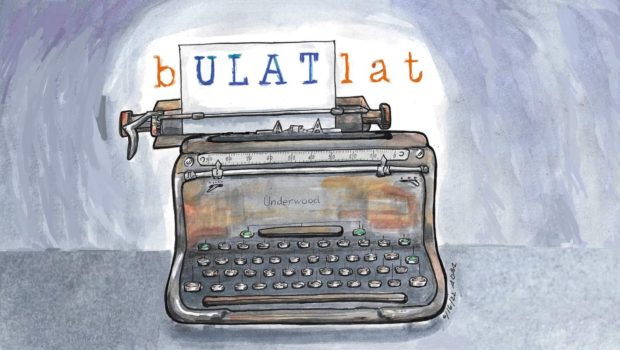DILG defends move to block sites with ‘terror’ links

An image posted by Bulatlat on Facebook. The website, accused by the state of having links to the communist group CPP-NPA, is no longer available or searchable on the internet.
MANILA, Philippines — The Department of the Interior and Local Government (DILG) has defended the National Telecommunications Commission (NTC) order to shut down websites allegedly linked to terrorist organizations, stressing that even international laws recognize that free speech is not absolute.
DILG spokesperson Undersecretary Jonathan Malaya on Thursday said that websites and organizations affected by the NTC sanction may still seek the intervention of the Supreme Court (SC), but noted that there are previous decisions of the high tribunal providing jurisprudence on the matter.
“Some types of speech may be subjected to some regulation by the State under its police power, in order that it may not be injurious to the equal right of others or those of the community or society,” Malaya said.
Malaya’s statements came after the NTC blocked some websites — including alternative media organizations, upon the request of National Security Adviser Hermogenes Esperon Jr. due to their supposed affiliation with the Communist Party of the Philippines, the New People’s Army, and the National Democratic Front (CPP-NPA-NDF).
At least 27 websites from 25 organizations — including alternative media sites Bulatlat and Pinoy Weekly, two news publications focusing on the plight of workers from different under-appreciated sectors like farmers, fisherfolk, human rights defenders, and activists, and urban poor concerns.
READ: NTC orders websites ‘affiliated to, supporting terrorist organizations’ blocked
Officials of PinoyMedia Center Inc., the publisher of Pinoy Weekly and other sites, said that the decision of NTC and the National Security Council headed by Esperon is an outright violation of free speech.
But Malaya insisted that the websites mentioned and taken down have a clear link to terrorist organizations. He also stressed that Section 2 of Republic Act No. 11479 of the Anti-Terrorism Act of 2020 is a legal basis for taking down the websites.
R.A. No 11479 states that: “It is declared a policy of the State to protect life, liberty, and property from terrorism, to condemn terrorism as inimical and dangerous to the national security of the country and to the welfare of the people, and to make terrorism a crime against the Filipino people, against humanity, and against The Law of Nations”.
“It cannot be denied that the propaganda contained in the terrorist websites are being used to advance the illegal cause of the terrorists, in this case, the CPP-NPA-NDF, which is to overthrow the government through violent means and destroy our democratic way of life,” Malaya claimed.
He also mentioned that Section 9 of the law covers activities that could be construed as inciting acts of terrorism.
“I wish to emphasize that inciting to commit terrorism is a criminal act in Sec.9 of RA 11479, which reads: Section 9. Inciting to Commit Terrorism.- Any person who, without taking any direct part in the commission of terrorism, shall include others to the execution of any of the acts specified in Section 4 hereof by means of speeches, proclamations, writings, emblems, banners, or other representations tending to the same end,” he added.
Aside from the organizations affected by the takedowns, other organizations like the Human Rights Watch (HRW) have condemned the NTC order for supposedly being a form of censorship. According to HRW, this is merely a means to harass and red-tag civil society groups which have been critical of the government. — With reports from Nicole Faye Agcaoili, trainee
RELATED STORY
NTC order to block red-tagged sites can be challenged – Carpio
More groups decry NTC order to block sites linked to ‘terrorist organizations’
Telcos ordered to block 27 websites with alleged communist ties